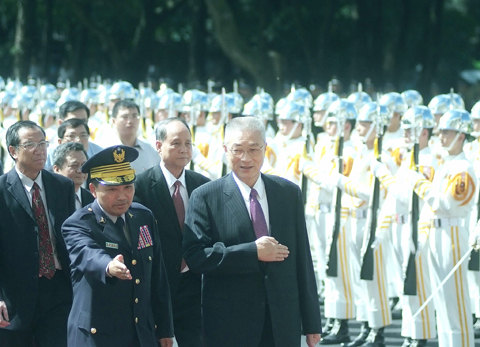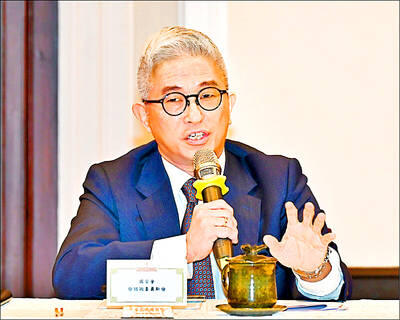Labor groups and opposition lawmakers expressed anger toward Premier Wu Den-yih (吳敦義) yesterday over his comment that the inventor of unpaid leave should receive a Nobel prize.
The premier’s effort to downplay the incident did little to quell the anger.
“Premier Wu should apologize to all workers or step down. Treating workers like they are disposable should not be legally allowed,” said Son Yu-lian (孫友聯), secretary-general of the Taiwan Labour Front, referring to Wu’s remark on Tuesday during a meeting with firms that won the Ministry of Economic Affairs’ award for creating substantial job opportunities.

PHOTO: CHOU MIN-HUNG, TAIPEI TIMES
Wu said those who created the system deserved the Nobel Prize because the system helped businesses retain ties to their employees amid the global economic crisis, without having to pay a lot of money to lay off staff, with the added benefit that employees could return to their jobs when the economy improved.
Many high-tech and manufacturing companies put their workers on unpaid leave, with the result that salaries fell close to or below the minimum wage level. As many as 240,000 workers were on unpaid leave in March last year, a period in which firms slashed production targets because of falling demand.
Labor activists called the premier “brain dead,” saying he was insensitive to workers’ plight.
Taiwan Confederation of Trade Unions secretary-general Hsieh Chuang-chih (謝創智) said that if there were a Nobel prize for those who caused the most destruction to labor rights, the inventor of unpaid leave would be a sure winner.
“The premier himself has said that if workers on unpaid leave were counted as unemployed, then jobless rates would soar to 8 percent rather than 5 percent,” Hsieh said. “So it is not surprising that the government has praised the concept of unpaid leave because it paints a false picture of prosperity.”
While some companies were on the brink of collapse and could not survive without reducing labor costs, many others enjoyed huge profit margins, but joined the wave of unpaid leave to take advantage of the labor savings.
Democratic Progressive Party (DPP) lawmakers called Wu’s comment a setback for the labor movement and asked him to retract his comment, apologize to workers nationwide or resign.
DPP Legislator Chen Ting-fei (陳亭妃) said the comment showed just how out of touch Wu was with the rest of the country. The government should be more focused on economic recovery instead of trying to trim back hard-won concessions from the working class, Chen said.
“These remarks come at a time when so many families have suffered from these unpaid holidays … so many people can’t pay their mortgage and are concerned about their next paycheck,” Chen said.
DPP Legislator Huang Wei-cher (黃偉哲) suggested Wu trying some unpaid leave himself.
“If Wu thinks that this idea should win a Nobel Prize … he should immediately take a two month unpaid holiday to see how it feels,” Huang said. “This might be of even greater benefit to Taiwan’s society and economy.”
DPP spokesperson Tsai Chi-chang (蔡其昌) said the party opposed Wu’s stance because the premier had failed to take into account the growing difference between the “haves and have-nots,” and unpaid leave unfairly benefited corporate interests.
KMT Legislator Lo Shu-lei (羅淑蕾) joined in the criticism, saying Wu was disrespectful to laborers and had “hurt laborers’ feelings.”
However, KMT Legislator Ho Tsai-feng (侯彩鳳) defended Wu, saying the premier might be saying that the system helped employees secure their jobs amid the downturn.
Ho said the inventor of unpaid leave did deserve to be honored, but added that she hoped companies would no longer use the system because forcing employees to take unpaid leave was the same as forcing them to take a pay cut.
Meanwhile, Wu tried to defend himself yesterday, saying he did not really mean to recommend the companies try for a Nobel Prize.
“[The system] helped [laborers] keep their labor insurance and maintained companies’ ties with the employees amid harsh economic times. [Employees] can go back to work afterwards,” Wu said when approached by reporters for a comment. “God … People need to have more of a sense of humor.”

A car bomb killed a senior Russian general in southern Moscow yesterday morning, the latest high-profile army figure to be blown up in a blast that came just hours after Russian and Ukrainian delegates held separate talks in Miami on a plan to end the war. Kyiv has not commented on the incident, but Russian investigators said they were probing whether the blast was “linked” to “Ukrainian special forces.” The attack was similar to other assassinations of generals and pro-war figures that have either been claimed, or are widely believed to have been orchestrated, by Ukraine. Russian Lieutenant General Fanil Sarvarov, 56, head

SAFETY FIRST: Double the number of police were deployed at the Taipei Marathon, while other cities released plans to bolster public event safety Authorities across Taiwan have stepped up security measures ahead of Christmas and New Year events, following a knife and smoke bomb attack in Taipei on Friday that left four people dead and 11 injured. In a bid to prevent potential copycat incidents, police deployments have been expanded for large gatherings, transport hubs, and other crowded public spaces, according to official statements from police and city authorities. Taipei Mayor Chiang Wan-an (蔣萬安) said the city has “comprehensively raised security readiness” in crowded areas, increased police deployments with armed officers, and intensified patrols during weekends and nighttime hours. For large-scale events, security checkpoints and explosives

‘POLITICAL GAME’: DPP lawmakers said the motion would not meet the legislative threshold needed, and accused the KMT and the TPP of trivializing the Constitution The Legislative Yuan yesterday approved a motion to initiate impeachment proceedings against President William Lai (賴清德), saying he had undermined Taiwan’s constitutional order and democracy. The motion was approved 61-50 by lawmakers from the main opposition Chinese Nationalist Party (KMT) and the smaller Taiwan People’s Party (TPP), who together hold a legislative majority. Under the motion, a roll call vote for impeachment would be held on May 19 next year, after various hearings are held and Lai is given the chance to defend himself. The move came after Lai on Monday last week did not promulgate an amendment passed by the legislature that

PENTAGON ASSESSMENT: A US report said that even as China and Russia deepen their partnership, cooperation is hindered by a ‘mutual distrust’ of each other The Chinese People’s Liberation Army (PLA) as of October had doubled the number of ships and airplanes deployed around Taiwan compared with the previous two years, Vice Minister of National Defense Hsu Szu-chien (徐斯儉) said yesterday, a day after the opposition-controlled legislature voted against reviewing the government’s general budget for next year, including a NT$1.25 trillion (US$39.71 billion) special defense spending bill. The legislature’s vote against the Ministry of National Defense’s spending plans was regrettable, as the budget was designed to respond to the developing Chinese military threat, Hsu said on the sidelines of a legislative meeting on the general budget. Defense